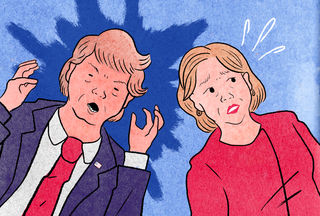Bias
How Americans Can Make the Best Presidential "Hire"
The American people are hiring a CEO and we should avoid common hiring errors.
Posted October 8, 2016

The American people are engaged in a job search for our chief executive. It’s an important hire and we’d do well to avoid common errors leading to hiring mistakes.
Some bad hires happen because employers take hiring shortcuts and don’t engage in due diligence. Given the stakes, Americans should carefully evaluate candidate experience and policy positions and follow-up with fact checks. They should take what is known in social psychology as the central route to persuasion. In contrast, taking the peripheral route to persuasion is ill advised for important hiring decisions. It’s risky to take decision-making shortcuts such as simply choosing the most likeable or charming candidate or the candidate that looks the part, or the one recommended by friends or family. Ditto for choosing a candidate simply because it’s our party’s candidate, or a candidate is supported by our favorite pundits or religious leaders. People that are unmotivated, busy, or lacking in cognitive ability are susceptible to peripheral persuasion and that’s a danger to our democracy.
Another cognitive shortcut is to assume that the more assertive someone is in their claims, the more truthful they are. In the social psychology of cognitive errors, we find the overconfidence phenomenon. Research shows that although we are inclined to assume that confidence is associated with correctness, it isn’t. Assuming a candidate is competent and their claims (or denials) are true because they so confidently and repeatedly say so is risky. The most effective liars sell their lies with their confidence. To paraphrase Richard Pryor, “Who you going to believe? Me or your lying eyes?”
Organizational psychologists warn against hiring toxic employees high in Machiavellianism, narcissism, and psychopathy (“the dark triad”). Toxic employees are skilled persuaders and manipulators and peripheral persuasion masters. These arrogant charmers have an excessive need for admiration and a strong sense of entitlement that leads them to become aggressive when others cross them.They’re callous and selfish and feel little guilt and remorse when their actions harm others.The dark triad is associated with unethical CEO behavior. Unfortunately, people with these traits are often skilled impression managers.They sell us on hiring them and then they loot the organization for their own ends, leaving others holding the bag. The interview process is usually too short to detect them but our long election process provides the evidence we need.
Hiring errors also arise from implicit bias. Sexism, racism, and heterosexism resulted in elected leaders that were almost exclusively white heterosexual men, so that’s what a leader looks like to many Americans. Research on role congruity theory (and leader prototype theory) shows that we subconsciously compare applicants to our prototypical leader stereotype and that affects who seems right for the job. Our stereotypes of a group may also be incompatible with our “good leader stereotype,” leading to bias. To overcome potential bias, it’s recommended that we objectively evaluate candidates using clear job criteria.
When you’re hiring, you look for a good “person-job fit.” The American people are hiring for the position of America’s CEO and we should choose the candidate that demonstrates effective leadership and decision-making. Research shows that democratic leaders that seek out different viewpoints and orchestrate democratic decision-making processes are most effective. For complex decisions, leaders should consult an array of experts with divergent viewpoints; those likely to be affected by a policy; and those that have to implement a decision. We also know that groupthink (and the poor decisions that arise from it) is more likely when a leader surrounds themselves with “yes” men and women, and defensively banishes or attacks those that disagree.
Most organizations wouldn’t hire a CEO with evidence of legal wrongdoing, unethical behavior, or sexism, racism, or heterosexism. Neither should the American people. Responding to scandal and lawsuits is time-consuming and expensive, and detracts from the organization’s mission. Such leaders often end up stepping down or being fired anyway, creating chaos and instability.
Our long election cycle provides the data we need to hire the best candidate for the job and we should use it. There’s a lot at stake and it’s better to make the right hire than it is to get rid of a bad one.


